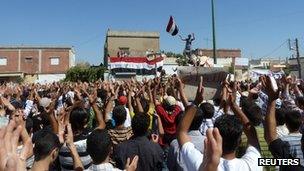Turkey imposes economic sanctions on Syria
- Published

Turkey has announced a raft of economic and financial sanctions on Syria over its violent crackdown on protesters.
Foreign Minister Ahmet Davutoglu said President Bashar al-Assad's government had "come to the end of the road".
The Arab League announced sanctions on Sunday and the Organisation of Islamic Co-operation urged Syria to comply with the league and allow in observers.
The UN says at least 3,500 people have been killed in Syria since the start of the protests.
Dubai earlier suggested that airlines from the United Arab Emirates would suspend flights to Syria next week.
The UAE's main airlines are Emirates and Etihad, and Dubai acts as a transport hub for the region.
The announcement later disappeared from the Dubai government's Twitter feed. It is not yet clear when the Arab League's ban on commercial flights will take effect.
Turkey's sanctions mostly target the Syrian leadership. The foreign minister said all those responsible for violence against civilians, and businesses close to President Assad, were banned from travelling to Turkey, and their assets there would be frozen.
All financial relations with Syrian state banks are also being stopped. A ban on arms sales is already in place.
Last week a convoy of Turkish buses was fired at by Syrian troops, and the government has warned all Turkish citizens to avoid travelling there.
Yesterday the foreign minister said Turkey did not support military action against Syria but did not rule out the possibility of a buffer zone on the border to contain any mass influx of refugees.
Turkey's transport minister said Ankara was looking at new transit routes to bypass Syria, should the situation there worsen. He said Turkey would open new border gates with Iraq, to enable trade with Saudi Arabia and Gulf states to go via Iraq and Jordan instead of Syria.
The Organisation of the Islamic Conference (OIC), the world's largest Islamic organisation, held emergency talks on Wednesday and later urged Damascus to "immediately stop using excessive force against civilians" and to "respond to the decisions of the Arab League".
Unprecedented sanctions
The Arab League's decision marks the first time the body has imposed such punitive measures on one of its own members.
As well as the suspension of commercial flights, the sanctions include the freezing of Syrian government assets in Arab countries, stopping dealings with the Syrian central bank, halting investment by Arab governments for projects in Syria, and a travel ban on senior officials.
In an interview with the BBC, the secretary-general of the Arab League said its approval of the unprecedented sanctions had sent a very serious political message to Syria.
Nabil al-Arabi said that the Syrian government could not carry on as if it was business as usual.
However, some Arab countries have questioned the feasibility of imposing these sanctions.
Protests against President Assad's government began in March, with demonstrators demanding the lifting of emergency rule and a genuine democracy.
The western city of Homs has become a focal point for the protests - and it is also one of the areas hardest hit by the bloody crackdown.
Prisoners released
The Syrian authorities say they have released 912 people detained for their involvement in protests against President Assad, and that 1,700 prisoners were released earlier this month.
Our correspondent in Beirut, Jim Muir, says it is not clear whether these releases are related to the international pressure Syria is facing.
Activists say thousands of prisoners are still being held.
The Syrian information minister admitted that the effects of the sanctions would be felt but said that Syria was "self-reliant" and would meet its needs.
He said steps would be taken to prevent price hikes and profiteering.